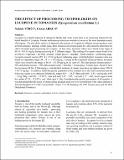Please use this identifier to cite or link to this item:
http://hdl.handle.net/11547/2538Full metadata record
| DC Field | Value | Language |
|---|---|---|
| dc.contributor.author | Türüt, Nahide | - |
| dc.contributor.author | Arkun, Güner | - |
| dc.date.accessioned | 2019-07-06T08:08:40Z | - |
| dc.date.available | 2019-07-06T08:08:40Z | - |
| dc.date.issued | 2017 | - |
| dc.identifier.issn | 2149-5777 | - |
| dc.identifier.uri | http://hdl.handle.net/11547/2538 | - |
| dc.description.abstract | Lycopene is a natural pigment of carotenoid family and recent years there is an increasing interest for the health benefits of lycopene. Tomato and tomato products are considered as one of the most important source of lycopene. The aim of this study is to determine the amount of lycopene in different tomato products such as fresh tomatoes, ketchup, tomato juice, dried tomatoes and tomato paste. It is also aimed to determine the effect of tomato paste processing on lycopene. In this study, lycopene values were found in the range of 89.14 - 581.35 mg/kg during processing at 5 different stages. The ranking of lycopene values found to be as follows: evaporator ˃ the final product (tomato paste) ˃ shredder ˃ fresh tomatoes ˃ preheating stage. Lycopene amount was low (89.14 ± 1.476 mg/kg) at preheating stage, while the highest lycopene value was found at evaporation stage (581.35 ± 11.795 mg/kg). Among all the examined tomato products, lycopene values were found in the range of 88.56 - 550.30 mg/kg in the order of : The final product (tomato paste) ˃ 50% dehydrated tomato ˃ 70% dehydrated tomato ˃ ketchup ˃ tomato juice. Tomato juice found to have low lycopene (88.56± 2.566 mg/kg), while the final products of tomato paste have the highest value (550.30 ± 46.75 mg/kg). In addition, some the quality properties of the products have also been examined and the following results were obtained: Soluble dry matter 28.01 – 28.27 °Brix, pH 4.06 – 4.52, total acidity 0.07 – 1.13g/100g, ash 0.41 – 13.38 %, color (a/b rate) 1.82 – 2.45, viscosity 3.57 – 4.03, invert sugar at total dry matter 42.29 – 322.97%; and black spot 0 /10g. Considering the quality parameters of all samples, it was determined that the result of chemical and physical analyses were in conformity with values defined in Turkish Standards (TS 1466 Tomato Paste - Puree, TS 5282 Ketchup, TS 1595 Tomato juice and TS 3926 Dehydrated Tomatoes) | tr_TR |
| dc.language.iso | en | tr_TR |
| dc.publisher | International Journal of Food Engineering Research (IJFER) | tr_TR |
| dc.subject | Tomatoes | tr_TR |
| dc.subject | Lycopene | tr_TR |
| dc.subject | Antioxidant activity | tr_TR |
| dc.subject | Tomato products | tr_TR |
| dc.title | THE EFFECT OF PROCESSING TECHNOLOGIES ON LYCOPENE IN TOMATOES (Lycopersicon esculentum L.) | tr_TR |
| dc.type | Article | tr_TR |
| dc.publisher.firstpagenumber | 26 | tr_TR |
| dc.publisher.lastpagenumber | 32 | tr_TR |
| dc.identifier.bibliographictag | TÜRÜT Nahide, ARKUN Güner, THE EFFECT OF PROCESSING TECHNOLOGIES ON LYCOPENE IN TOMATOES (Lycopersicon esculentum L.)(2017), International Journal of Food Engineering Research (IJFER) | tr_TR |
| Appears in Collections: | International Journal of Food Engineering Research (IJFER) | |
Files in This Item:
| File | Description | Size | Format | |
|---|---|---|---|---|
| ijfer_3_1_p026-032.pdf | 339.07 kB | Adobe PDF |  View/Open |
Items in DSpace are protected by copyright, with all rights reserved, unless otherwise indicated.
